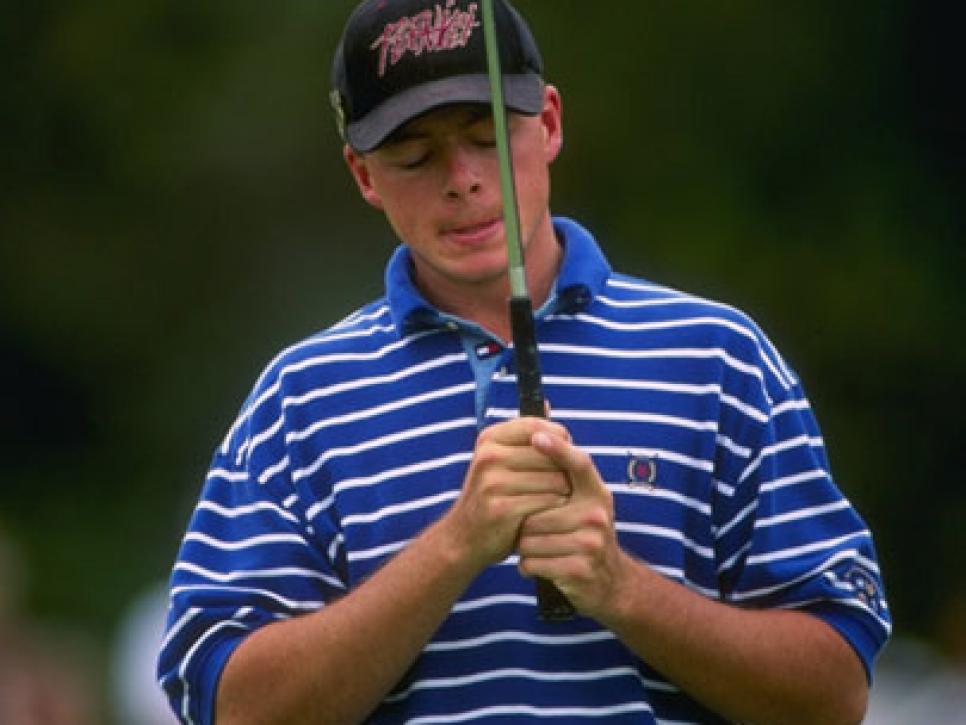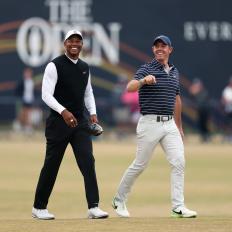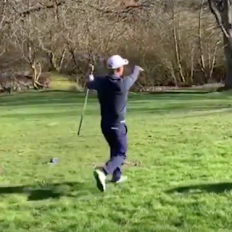Tiger's 11 Unlikeliest Challengers

Steve Scott, 1996 U.S. Amateur
One of Tiger Woods' fiercest opponents was a guy who couldn't even make it past PGA Tour Qualifying School in six attempts. And yet for most of the 36-hole U.S. Amateur final in 1996, Scott was poised to break Woods' run of five-consecutive USGA titles (three U.S. Juniors and two U.S. Ams). He had a 5 up lead that Sunday, only to see Woods roar back to force extra holes and eventually win his third consecutive U.S. Am on the 38th hole. Scott would never know such heights as a golfer again. He played in a Walker Cup the next year, and has tried to qualify for the U.S. Open, but is mostly content as a club pro in New Jersey.
Ed Fiori, 1996 Quad Cities Classic
Not long after Woods' last U.S. Am triumph, he took a one-shot lead into the final round of the Quad Cities Classic in hopes of locking down his first PGA Tour title. Instead, he stumbled early that Sunday and was passed by Fiori, a then-43 year old career grinder who had already sent in his application for that year's Q School. The tournament marked the first of just nine occasions in Woods' professional career that he didn't win when entering the final round with the lead.
Constantino Rocca, 1997 Ryder Cup
It didn't take long for Woods to learn that the Ryder Cup was a different animal than any other week on tour. While Woods had already gone a meager 1-2-1 in his first four matches, the assumption was he would clean up in singles against Constantino Rocca, the Italian veteran who shot 75 when paired with Woods in the final round at that year's Masters. Instead, Rocca dusted Woods 4 and 2 in what became a resounding victory for Europe, the first of what would be a string of frustrating Ryder Cups for the world No. 1.
Billy Mayfair, 1998 Nissan Open
Although the 1998 season was one in which Woods was immersed in his first major swing overhaul, you still had to like his chances against Billy Mayfair, a steady but relatively unspectacular tour player who birdied the last hole of regulation to earn a spot in a playoff with Woods. Mayfair's birdie against Woods' par on the first extra hole was good for the win. To this day it remains Woods' only loss in 12 professional playoff appearances.
Bob May, 2000 PGA Championship
When Woods was playing junior golf in Southern California, Bob May was a player he aspired to be like. By the time the two crossed paths at the 2000 PGA, that thought seemed ludicrous. Woods was the dominant player in the world, fresh off historic wins in both the U.S. and British Opens, while May was a career journeyman whose name barely registered until his final round 66 at Valhalla forced a playoff with the world No. 1. The final round and the three-hole playoff that followed was defined by brilliant golf by both players, and yet as quickly as May's name appeared, that's how quickly it was gone. He would never again crack a top 30 in a major championship.
Rich Beem, 2002 PGA Championship
Although Beem wasn't paired with Woods in the final round of the PGA at Hazeltine, he faced an arguably more difficult task of trying to keep his final round together with Woods making noise in the group ahead. While Woods was closing with four consecutive birdies to take the clubhouse lead, the unheralded Beem rolled in a 35-foot putt for birdie on 16 to go up two. He made bogey at the last, but that was still good enough to claim the title and make Woods a runner-up in a major for the first time in his career.
Michael Campbell, 2005 U.S. Open
Much like Beem, Campbell didn't have much of a major championship pedigree to call on when he found himself trying to fend off Woods late in the final round at Pinehurst. But while a host of other players faltered around him, the New Zealand native posted a 69 in difficult, breezy conditions, while Woods stumbled late with bogeys on the 16th and 17th holes. The U.S. Open win was validation for a player who had been touted as a future star when he first turned pro. But it didn't last. Although he posted top 10s in the final two majors of 2005, Campbell hasn't made a cut in a major in five years.
Zach Johnson, 2007 Masters
Playing in the final group on Sunday, Woods appeared a lock to claim a fifth Masters title when he took the lead on the second hole. Instead, he was outplayed by self-proclaimed "normal guy" Johnson, who made three birdies in a crucial four-hole stretch while Woods made disappointing pars on each of the last five holes. The 69 for Johnson against Woods' 75 was good for a two-shot win, marking the first time in Woods' career he didn't win a major while playing in the final group. It wouldn't be the last time.
Angel Cabrera, 2007 U.S. Open
For the second-straight major, Woods found himself chasing a player with a career resume that paled in comparison to his own. But Cabrera, a long-hitting former caddie from Argentina, had handled Oakmont enough to shoot 69 and take a one-shot lead into the clubhouse. Needing a birdie on one of the last three holes, Woods parred 16 and 17, then saw his birdie attempt from 30 feet on 18 sail past the hole. Although Cabrera emerged as a surprise winner at Oakmont, his Masters win two years later validated him as an elite player.
Rocco Mediate, 2008 U.S. Open
At Torrey Pines, a venue where Woods had won five times already in the annual PGA Tour event, the only thing appearing to stand in his way was a troublesome knee. In fact, more nagging was Mediate, a tour veteran with a creaky back who needed a sudden-death playoff just to qualify for the Open. Mediate scrapped his way to the clubhouse lead on Sunday, but saw his chances of winning dashed when Woods tumbled in a 20-foot birdie putt on the final hole to force an 18-hole playoff. The next day, Mediate faced a 20-footer for birdie on the final hole of the playoff that would also have given him the win. He missed that one, then bogeyed the first hole of a sudden-death playoff, but the runner-up showing was still a career highlight for Mediate. "I can't really complain," he said. "I did the best I could."
Y.E. Yang, 2009 PGA Championship
For all of Woods' flashes of vulnerability in recent years, he was still 14 for 14 in majors when he entered the final round with at least a share of the lead. That trend looked to continue at Hazeltine in 2009, when he entered Sunday with a two-shot lead over the relatively-unknown Y.E. Yang. Yang hung with Woods all day, then moved into the lead on his own when he chipped in for birdie on 14. From there, the South Korean never let go. On the final hole, his hybrid shot from 210 yards to eight feet essentially clinched the win, leading to what may have been the most shocking loss of Woods' career.


